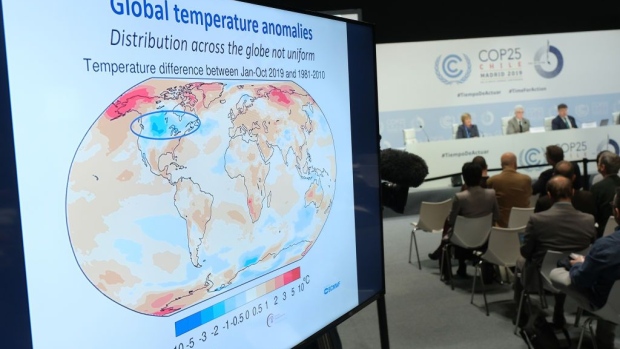Dec 4, 2019
No Climate Change Deal Is Better Than a Bad Deal, Spain Says
, Bloomberg News

(Bloomberg) -- Spain would rather have envoys from almost 200 countries come back empty-handed after two weeks of climate change talks than push through a bad deal.
Spain, which is hosting the United Nations’ annual conference on climate change, is hopeful that an agreement will be reached that will tie up the last remaining details needed to implement the 2015 Paris Agreement, said Teresa Ribera, minister for Ecological Transition. But an agreement can’t happen at any cost.
“Our biggest challenge is how to solve this the right way,” Ribera said in an interview at the meeting known as COP25 in Madrid. “It is not viable to think that it’s so important to get this done that we can sacrifice everything else.”
Negotiators at the talks this year are working on fleshing out Article 6 of the Paris Agreement. The article refers to the creation of a global carbon market mechanism that may allow countries to generate credits from projects that reduce pollution. The idea is to allow trading of those credits, which in theory pushes funding toward places where the biggest gains can be made most cheaply.
Spain would rather have envoys from almost 200 countries come back empty-handed after two weeks of climate change talks than push thorugh a bad deal.
Spain, which is hosting the United Nations’ annual conference on climate change, is hopeful that an agreement will be reached that will tie up the last remaining details needed to implement the 2015 Paris Agreement, said Teresa Ribera, Minister for Ecological Transition. But an agreement can’t happen at any cost.
“Our biggest challenge is how to solve this the right way,” Ribera said in an interview at the meeting known as COP25 in Madrid. “It is not viable to think that it’s so important to get this done that we can sacrifice everything else.”“I am in favor of this remaining aspect of the Paris Agreement is resolved as soon as possible, but not at any cost,” she said.
Negotiators at the talks this year are working on fleshing out Article 6 of the Paris Agreement. The article refers to the creation of a global carbon market mechanism that may allow countries to generate credits from projects that reduce pollution. The idea is to allow trading of those credits, which in theory pushes funding toward places where the biggest gains can be made most cheaply.
While the discussions are highly technical, there are some broader guidelines that need to be followed, Ribera said. Any agreement will have to avoid the so-called double-counting in which reduction of emissions could be logged both by the polluter and the buyer of the credit. That was a controversial loophole that helped undo the previous UN carbon market, known as the Clean Development Mechanism.
“No country can be tempted to say they want everything — and get angry if they don’t get it,” Ribera said. “There are some fundamental things for this to work, and it doesn’t make sense to accept it if it doesn’t work.”
She also said that any deal must set out a carbon market structure that works, that’s attractive to investors and allows for more ambitious targets. Those features would help the mechanism give clear signals to developers about the value of their work and to environmentalists that the trading measures produce genuine gains for the atmosphere.
The system would have to guarantee liquidity and stability of prices to avoid great distortions that would lead to uncertainty.
“I can’t go and tell people that have made business decisions in expectations of a stable price around the 25 to 30 euros we have in the European Union that I’m suddenly going to flood the market and corrupt the system,” Ribera said.
Other details need to be agreed as well. Those include the start date for the new system and a step-by-step guide for implementation. She’d also like to see a common trading system that all parties can use.
“Of all the elements in the Paris Agreement, this is the one that can be most easily isolated,” Ribera said. Article 6 “is a facilitating tool, a positive instrument, but it is not essential.”
To contact the author of this story: Laura Millan Lombrana in Madrid at lmillan4@bloomberg.net
To contact the editor responsible for this story: Reed Landberg at landberg@bloomberg.net, Rakteem Katakey
©2019 Bloomberg L.P.


